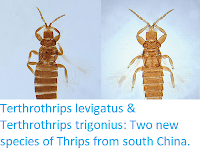Thrips are tiny (usually less than one millimetre) Insects with greatly
reduced wings that resemble feathery stubs. They are plant-parasites,
with some species being significant agricultural pests, but due to their
small size are often overlooked, and apart from a few species with
major economic impact, are not well studied. The genus Konothrips is known only from the southern United States, where two species have been found living inside the flowers of Grasses.
In a paper published in the journal Zootaxa on 1 November 2017, Arturo Goldarazena of the Earth and Life Institute Biodiversity Research Centre at the Université catholique de Louvain, Adam Mitchell of the Department of Entomology and Wildlife Ecology at the University of Delaware, and Thierry Hance, also of the Earth and Life Institute Biodiversity Research Centre, describe a third species of Konothrips from Delaware.
The new species is named Konothrips polychaeta, which means 'many hairs', though an explanation for this is not given. The species is described from two female specimens found inside the flowers of the Broom-sedge, Andropogon virginicus, in the Ashland Natural Reserve in New Castle County. These measure 200 μm and 190μm in length, respectively, and are brown in colour with a darker head and forequarters.
Konothrips polychaeta, female specimen. Goldarazena et al. (2017).
Goldarazena et al. note that Broom-sedge is found across the eastern United States as far north as the Great Lakes, and that Konothrips polychaeta could potentially have an equally large distribution. The larvae of all species of Konothrips are unknown, but the closely related Old World genus Chirothrips are known to live entirely within flowers, making it likely that those of Konothrips do the same.
See also...
Follow Sciency Thoughts on Facebook.







